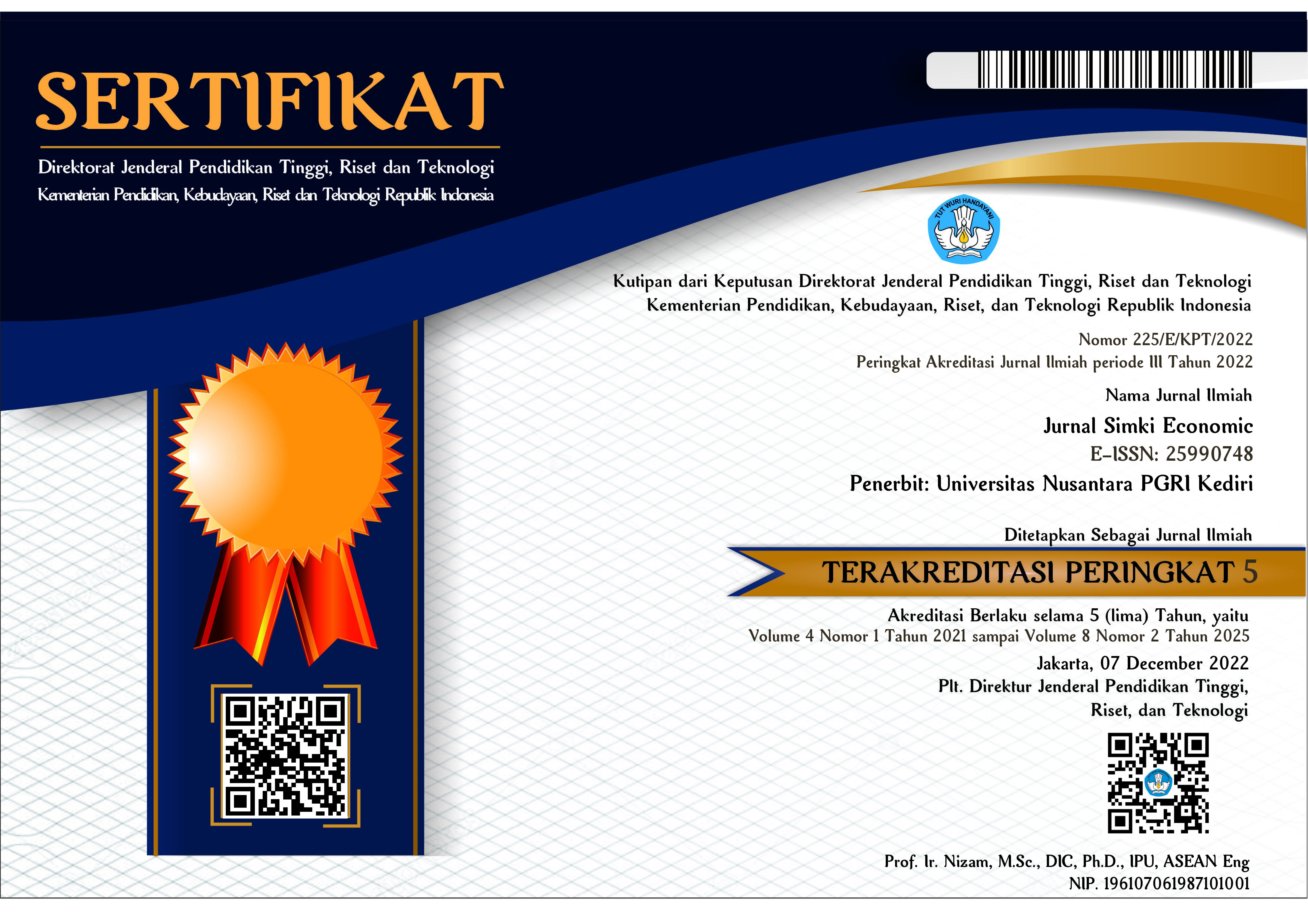Pengaruh Self Efficacy, Budaya Organisasi, dan Soft Skill terhadap Kinerja Karyawan pada Bank BRI Kanca Bengkulu
 Abstract views: 238
,
Abstract views: 238
,
 PDF (Bahasa Indonesia) downloads: 109
PDF (Bahasa Indonesia) downloads: 109
Abstract
The purpose of this study was to identify the influence of organizational culture, soft skills, and self-efficacy on the performance of employees of Bank BRI Bengkulu Branch Office partially and simultaneously. The research method used is quantitative (explanatory research), namely research that highlights the relationship between variables and tests hypotheses that have been formulated external conflict. The population in this study were all employees of Bank BRI Kanca Bengkulu totaling 80 employees and using saturated sampling techniques. The application of multiple linear regression methods was used because the variables used were more than one that had one dependent variable. This analysis is to determine whether there is an influence of the independent variable on the dependent variable. The results of the study showed that the significance value <0.10 <0.05 and tcount is greater than ttable (2.648 is greater than 1.990), the results of the regression analysis showed that Self Efficacy (X1) had a significant effect on performance (Y). With a sig value of 0.720 > 0.05 and tcount is smaller than ttable ((0.360 is smaller than 1.990), organizational culture X2 does not have a significant impact on employee performance. With a sig value < 0.001 < 0.05 and tcount is greater than ttable (6.206 is greater than 1.990), soft skills (X3) have a significant impact on employee performance. Thus, Fcount 156.031 is greater than Ftable 2.73. Therefore, the performance of Bank BRI Kanca Bengkulu employees is influenced by soft skills, self-efficacy, and organizational culture.
Downloads
References
Anggraini, N. D., Firdaus, M. A., & Rinda, R. T. (2021). Pengaruh Soft Skill Dan Pengalaman Kerja Terhadap Kineja Karyawan, 4(3). https://ejournal.uika-bogor.ac.id/index.php/Manager/article/download/5914/3137/0
Asisdiq, I., Sudding, & Side, S. (2017). Pengaruh Self Esteem dan Self Efficacy terhadap Kinerja Karyawan Studi Kasus di PT. Finnet Indonesia Effect. Pendidikan Kimia PPs UNM, 1(1). https://openlibrarypublications.telkomuniversity.ac.id/index.php/management/article/view/4388
Hanif, A., & Irbayuni, S. (2024). Pengaruh Rotasi Kerja Dan Self Efficacy Terhadap Kinerja Karyawan Kantor Pos Cabang Utama Surabaya 6000. Journal of Economic, Bussines and Accounting (COSTING), 7(5), 2559–2566. https://doi.org/10.31539/costing.v7i5.12053
Marsha, S. U. (2024). Pengaruh hard skill dan soft skill terhadap kinerja karyawan. Jurnal Ilmu Manajemen, 12(4), 793–803. https://doi.org/https://doi.org/10.26740/jim.v12n4.p793-803
Nurbiyati, A., & Permana, E. P. (2024). Penerapan Model Problem Based Learning dengan Media Wordwall untuk Meningkatkan Motivasi dan Hasil Belajar Siswa Mata Pelajaran Pendidikan Pancasila Materi Keragaman Budaya Indonesia. Jurnal Simki Postgraduate, 3(1), 15–26. https://doi.org/10.29407/jspg.v3i1.577
Sapitri, D., & Pancasasti, R. (2022). Efek Moderasi Budaya Organisasi Untuk Peningkatan Kinerja Karyawan. Technomedia Journal, 6(2 Februari). https://doi.org/10.33050/tmj.v6i2.1756
Sugiyono. (2023). Metode Penelitian Kuantitatif, Kualitatif, Kombinasi dan R&D. Alfabeta.
Tringgani, E., Sembiring, Z., Sari Lubis, A., Yuliana, Y., & Zulkarnaen, I. (2024). Pengaruh Hard Skill, Soft Skill, Dan Budaya Organisasi Terhadap Kinerja Karyawan PT. Bintang Utara Putra. Jurnal Mutiara Manajemen, 9(1), 78–89. https://doi.org/10.51544/jmm.v9i1.5108
Copyright (c) 2025 Yudisky, Idham Lakoni, Fauzan

This work is licensed under a Creative Commons Attribution 4.0 International License.














